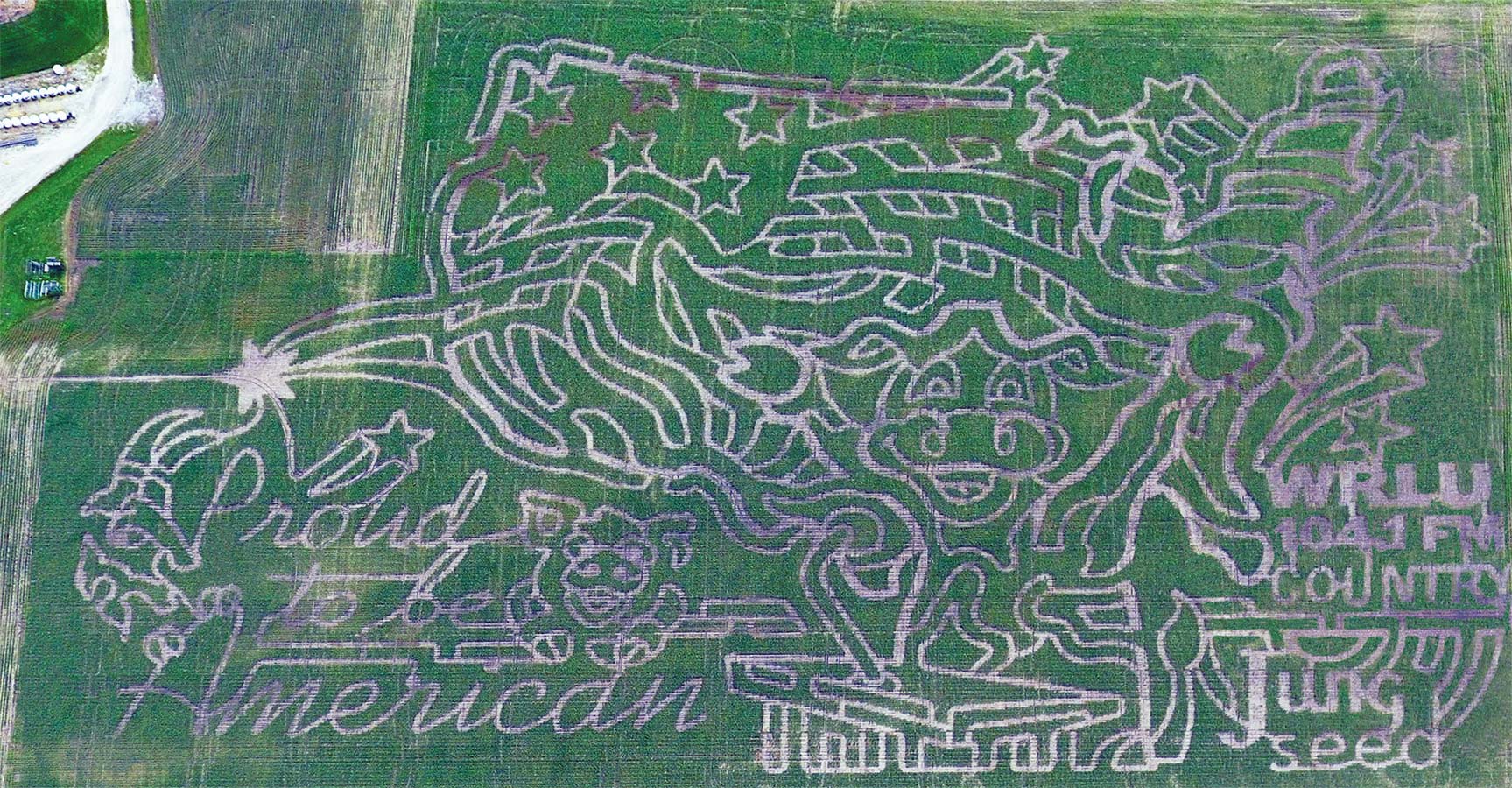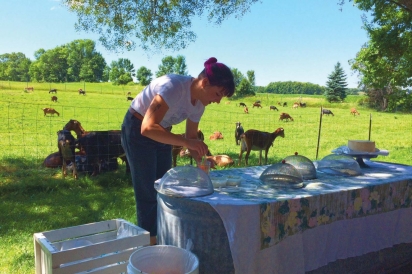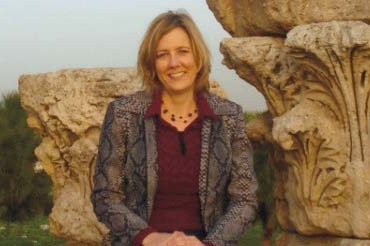Giving Tourists a Taste of Two Dairy Operations
Just east of Carlsville, down County Road I, Roxanne and Dennis Schopf are “up and at it” starting at 5:30 a.m., managing a multitude of tasks that come with operating the 575-herd dairy farm they have owned since 1995.
Every day, 365 days a year, 24-hours a day in eight-hour shifts, cows need to be milked and cared for, while crops that support them are planted, plowed and harvested. Combine these activities with managing a seasonal country store that hosts farm tours, serves lunch and dairy-based food favorites, and holds annual fund-raising events for the community, and one can imagine the complexities of operating an agri-tourism business like Schopf’s Hilltop Dairy and Dairy View Country Store.
A similar morning unfolds on a goat farm in nearby Sister Bay, as members of the “Team Cream” of Door County Creamery begin milking each day at 7 a.m. The day’s routine begins with a good grain and hay breakfast for the “girls”. Each of the 130 goats are greeted by name in the milking parlor where they spend six and a half minutes each, two times each day, contributing the protein-rich dairy that is the basis of fresh goat milk products at the Creamery. And while one team is busy at the farm, proprietors Jesse and Rachael Johnson and other key staff are busy just one mile away with their own responsibilities of making the fresh goat cheese, Chevre, and gelato and preparing to open their popular downtown Sister Bay store.
The Schopf family farm originated in the late 1800’s and has grown from a dairy farm with 50 Holstein cows when owned by Dennis’ grandparents to a progressive dairy operation that is a leader for its use of farming technology and is well known for its innovative approach to nutritional feeding.
Today, the Schopf’s Hilltop Dairy and Dairy View Country Store employs a total of 24 full and part-time people, including 12 who work in the dairy, eight full and part-time employees in the store, and others helping to manage crops like field corn, soybeans and alfalfa in the nearly 400 open acres surrounding the farm, as well as on an additional 600 acres throughout Door County.
When Roxanne and Dennis created the vision of combining the dairy farm with tourism more than 16 years ago, they had no idea how much interest the public would have in a dairy operation. Long before others were doing so, the Schopf family opened their “home” to inform and excite both young and old about the process of getting a gallon of milk from the farm to a grocery store shelf.
“It was surprising to us, especially to Dennis who grew up on a dairy farm, how little people know about farming,” Roxanne said. “It became an opportunity to educate visitors while making a living doing what we enjoy.”
Self-guided tours at the Dairy View Country Store at Schopf’s Hilltop Dairy invite visitors to look through a parlor window to observe how cows are milked, or they can experience “Cookie,” the mechanical milking cow. Guests can watch ice-cream being made in the store, and families with younger children can play outdoors or spend time in a petting zoo featuring goats, pigs, and a mini-horse.
Guided tours for groups of 25 or more are also available and are customized to the audience based on background and interest. While on a guided tour around the grounds, experienced farmers might ask about dairy production and feed. Business owners might wonder about current milk pricing, while children wish to know where milk comes from. The Johnson’s dairy experience is relatively new by comparison. The couple purchased 11 goats and began handcrafting cheese on their 27-acre goat farm in 2010. Together, they learned how to farm within the highly regulated Wisconsin dairy industry, and as the herd grew, discovered the nuances of efficiently raising and caring for La Mancha and Nubian goats.
During this same time, Jesse developed his cheese-making techniques and earned a Wisconsin Master Cheesemaker title and license. Goat’s milk cheese is considered an artisanal craft product, and it was the couple’s dream to bring this fresh, local, cheese, influenced by a farmstead in France, to the community.
In July 2013, Jesse and Rachael opened the Door County Creamery, a cheese-making facility and retail store to sell their cheese products and goat’s milk gelato. They added a deli eatery to join it all together. Last year they began offering Farm Lunch Tours that take visitors on an informative walking tour at the goat farm. Once there, guests are guided into the milking parlor and feeding barns, and many spend time near the goat pens for photo opportunities. A cheese-tasting experience is provided under a shade tree with apprentice Cheesemaker Natalie Ihde. Guests return to the facility for a lesson about goat cheese making. The 1.5-hour experience culminates with a lunch at a farmhouse table back at the Creamery that includes a choice of artisan sandwich, fresh salad or cheese-tasting slate incorporating their best-known products.
Like the Schopf’s, both Jesse and Rachel host portions of the tours and enjoy sharing their stories.
“We want to show and educate people about where our cheese comes from. The beginning is the most important part, and that’s on the farm to see how the goats live, what they eat, and how fresh dairy makes its way to the cheese-making process,” Jesse explained to a group of guests.
Door County Creamery implements organic farm practices. The goats eat local grain and hay grown and bailed on the farm. According to Jesse, the mix of the right food and timeliness in which it is processed helps create the mild, rich flavor in their cheese and gelato.
Schopf’s Dairy View Country Store welcomes hungry visitors to a homemade pizza buffet and a build-your-own sandwich bar featuring fresh toppings from local gardens and farm-market vegetables from 11:30 a.m. -1:30 p.m. Monday through Friday. However, the store is best known for its homemade ice cream and fudge made with their quality dairy- base of cream, milk and butter.
Making ice cream or homemade fudge is almost an everyday activity at the Dairy View Country Store. Customer favorites include caramel cashew in a cone or butter pecan by the pint. New this season is homemade chocolate chip cookie dough in a cone using a no-egg version from Roxanne’s great-grandmother’s recipe.
Roxanne spends most of her day talking with customers and employees inside and outside the store. As a destination location, each day’s activities are dependent upon who is visiting, as well as the time of year. When crops have matured enough for paths to form, the field around the Hilltop Dairy plays hosts to an expansive corn maze creating fall family adventures and the perfect attraction for annual community events including the Sunshine House Corn Festival in September.
“In Door County agri-tourism is such a potentially productive strategy because we already have the customers (tourists and visitors) coming to the area,” said Robert Burke, Community Resource Development Educator / Department Head for Door County’s UW-Extension.
“We hope to give guests a new experience and show them how we live. This isn’t everyone’s reality, but it is our every day. In a tourist area, when visitors are looking for something to do, this is pretty special and different,” Rachael said.
Both the Door County Creamery and Schopf’s Dairy View Country Store are seasonal; however, there is still plenty of time to visit, book a tour, shop, eat, or walk through the corn maze. Go to dairyview.com or doorcountycreamery.com for more details.
When the long day and season are done, the Schopfs and the Johnsons can rest assured that their guests leave with more knowledge and appreciation of local dairy farming.
It’s all About Sustainability
INTERNATIONALLY RECOGNIZED ECOTOURISM SPECIALIST LENDS EXPERTISE LOCALLY
Known both nationally and internationally, Susan Kennedy is a tourism specialist who is passionate about preserving natural and cultural heritage sites as well as the environment through sustainable tourism and community-based projects. Her primary work seeks to involve all stakeholders in the process while also ensuring that money gleaned from tourism benefits the local communities living in and around them.
“Sustainable tourism attempts to provide a delicate balance between people, profits and the planet. In addition, I like to add that it must also include visitor satisfaction,” Kennedy said.
Her career in tourism has taken her on a journey where she has played many roles: a presenter, an educator, a project manager and consultant, a researcher and, at times, a brand ambassador and chief promoter.
Originally from Appleton and a 1995 graduate of the University of Minnesota where she earned a Bachelor of Arts in journalism/advertising, she fulfilled a lifelong dream of becoming a U.S. Peace Corps Volunteer after a seven-year-long career in advertising, mostly working on cruise and airline accounts in both Seattle and New York. This overseas experience, combined with her private-sector tourism industry expertise, became the impetus to her goal of working in sustainable tourism development worldwide.
In 2006, she attained a Master of Tourism Administration in Sustainable Destination Management from The George Washington University and combined her private-sector work in tourism with international development. Kennedy assisted the government of Cambodia with its national branding campaign; has been a consultant for projects in Vietnam, Jordan, Bangladesh, Kazakhstan, Turkmenistan and Armenia; and has worked with archaeological sites after receiving a second master’s degree in managing archaeological sites from University College London. Although she still consults and works abroad, she moved back to the area in 2015 to live and work in a tourist destination, Door County.
According to Kennedy, a community-based or ecotourism model combines private and public initiatives and income; a portion of the proceeds,
typically 10 to 15 percent, goes to preserving natural or cultural sites or to benefiting the community in ways deemed necessary by the community. Although Door County does not have true community-based or ecotourism models in place, an example of how it might work here would be sharing a portion of tourism dollars generated by private businesses with the area’s state parks, or with other nonprofi t organizations that help to conserve the environment or preserve local heritage or industries.
“In effect, deterioration of a site through use or overuse is offset by this sort of fund, hence making it sustainable. It can also alleviate some of the need for government funding,” Kennedy explained.
For now, Kennedy suggested the greatest opportunity she sees is a focus on educating and involving more visitors to be advocates of conservation and sustainability.
“Many people and families have been coming here regularly for years and decades and I’m sure they would love to find ways to give back either financially or by volunteering a bit of their time, which we call ‘voluntourism’ in the industry,” she said. “Programs could be set up so that visitors are not just utilizing the services that Door County has to offer, but finding ways for them to give back to this place they love and creating more of a connection with local residents. That’s what sustainability is all about. Visitors would feel good about their efforts to assist, and local communities would be happy to have the extra help.
“We have great people in our community who are well-informed and know what should be done to help bring balance to Door County, but this does not always translate to tourists and the volunteer work ends up falling on local residents.”
She shared another example: If tourists understood that this area has fragile groundwater due to its geology, would they be willing to give up the perfect apple in exchange for a reduction in the amount of pesticides used to grow them? To Kennedy, it’s about education, awareness and balancing visitors’ expectations with what is also better for the environment and the communities who live here year-round. “This creates a win-win for everyone!” Kennedy explained emphatically.
She has developed guidebooks in other countries that focus on sustainable tourism by encouraging tourists to patronize socially and environmentally- conscious businesses and to give to nonprofit organizations that support community, culture and environment. Kennedy is hoping to use her skills and experience to develop a similar guide book here in Door County in the near future.
“People want to experience nature and different cultures throughout the world, but they should do so in a way that is sensitive to the local ecosystems and that provides benefits to local and indigenous communities,” Kennedy said.
Kennedy will be teaching a course this fall titled “The Public’s History, Cultural and Natural Heritage Management” at Lawrence University in Appleton. The topic will combine theory, practice, and a historical perspective in the management of cultural, historical and natural heritage both worldwide and locally. The course will review sustainable practices including conservation of the environment, interpretation methods, site navigation, marketing and branding. It will also address the involvement of local communities, tourism and other stakeholders. For more information about Susan Kennedy go to: susankennedy.org








